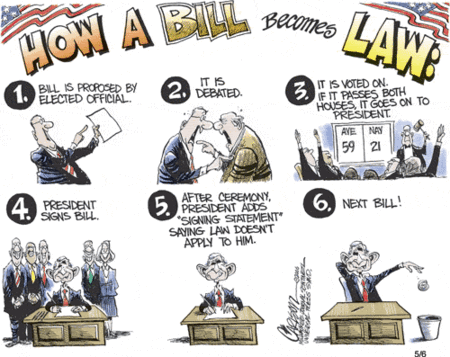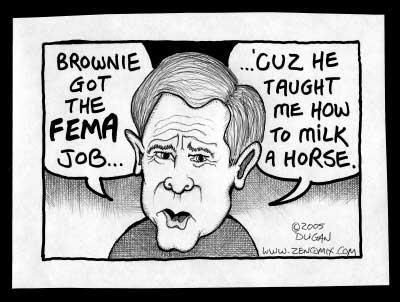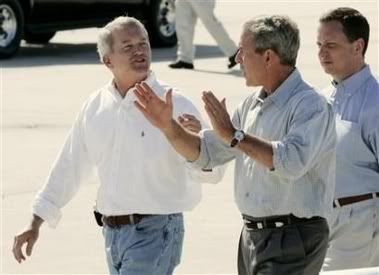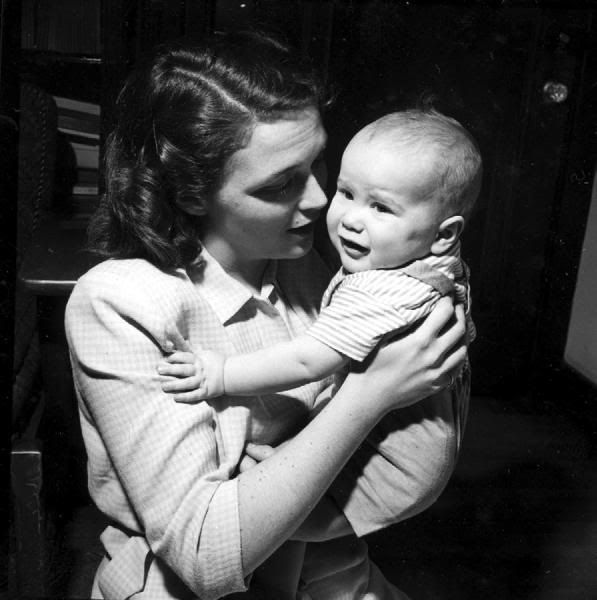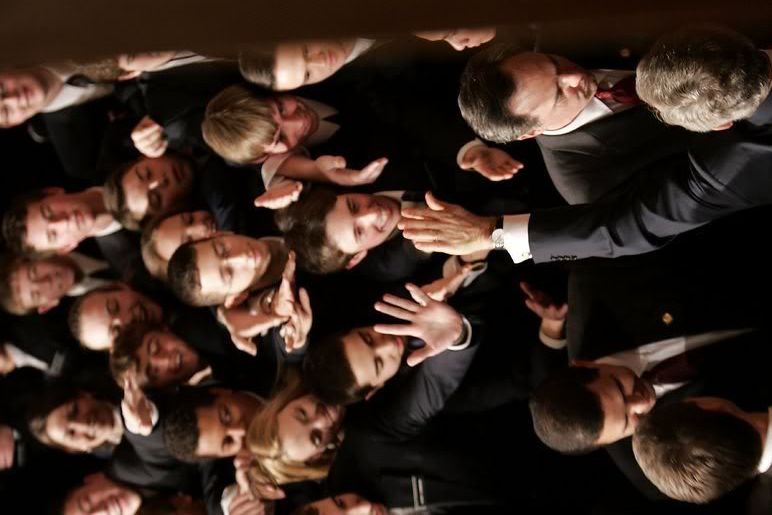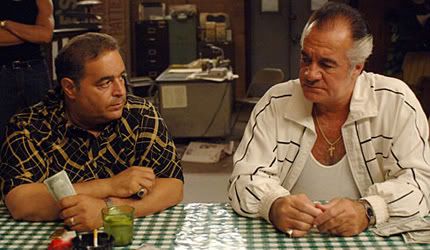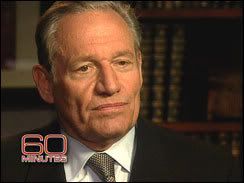Denver Man Sues Secret Service for Arrest After He Criticized Cheney on Iraq War
I know what you're thinking.
"He must be a nutcase, he was probably yelling, or threatening Cheney," but that doesn't seem to have been the case.
On Democracy Now!:
A federal lawsuit was filed on Tuesday against the U.S government alleging civil rights violations. The lawsuit was filed by Steven Howards - an environmental consultant in Colorado - who was arrested in June after he approached Vice President Dick Cheney and denounced the war in Iraq. The lawsuit is the third one that's been filed charging that Secret Service agents or White House staff members violated the law when they attempted to keep people with opposing views away from President Bush or Cheney. In another suit pending in Colorado, two people say they were kicked out of a public event where Bush was speaking because of an anti-war bumper sticker. And in West Virginia the ACLU has filed a lawsuit on behalf of two people who were arrested at an appearance by Bush because they were wearing anti-Bush t-shirts.
Steven Howards, was arrested in June on harassment charges after he approached Dick Cheney to denounce the Iraq War. He has filed a federal alleging civil rights violations.
AMY GOODMAN: Steven Howards joins us now from Denver, where he filed the suit on Wednesday in federal district court. Welcome to Democracy Now!
STEVEN HOWARDS: Thank you.
AMY GOODMAN: It’s good to have you with us. Why don't you explain exactly what happened? What day was it?
STEVEN HOWARDS: I think it was the middle of June, and I was in Beaver Creek, Colorado, with my two kids, accompanying them to a piano camp. And that morning, I had read about the deaths, the rising death toll in Iraq. And who walks by me, but Mr. Cheney. And to be honest, I couldn't resist the temptation. So I approached Mr. Cheney and told him that I thought his policies in Iraq were absolutely reprehensible.
AMY GOODMAN: Just one sec. He, by himself, walked by you in a mall? Vice President Dick Cheney?
STEVEN HOWARDS: Well, you know, yes. There was apparently -- Gerald Ford has an annual kind of get-together of political VIPs, if you will, that -- I don't know -- discuss world issues. And I was fortunate enough to have the opportunity to cross Mr. Cheney. Mr. Cheney was actually going across an outdoor mall, kind of a pedestrian mall, in Beaver Creek, Colorado. And there were lots of Secret Service agents, but he was walking through, taking some time, shaking hands. There were probably more Secret Service agents there than there were members of Joe Public. But I, you know, I waited my turn, and I walked up to Mr. Cheney, and I told him what I thought. And then I quickly exited, because I didn't want to create a scene or give anyone opportunity to cause me any problems.
AMY GOODMAN: And so, what happened next?
STEVEN HOWARDS: Well, I then continued on, took my child to piano camp, came back about ten minutes later, because if you know this area, you've got to pass through the same area. And I was approached by a Secret Service agent, who accused me of assaulting the Vice President. My eight-year-old son was standing next to me at that point in time. His exact words were, “Did you assault the Vice President?” And I said, “No, I didn't. But I did tell him the way I felt about the war in Iraq, and if Mr. Cheney wanted to be shielded from public criticism, he should avoid public places.”
And I closed by telling the agent that if freedom of speech was against the law, he should arrest me, at which point he grabbed me, cuffed my hands behind my back and started carting me across the mall. I stopped and told him I could not abandon my eight-year-old son in the middle of a public mall, at which point he responded, “We'll call Social Services.” Fortunately, on the way out, we passed my wife, who -- my son was with my wife. He had run off in terror. He wouldn't even talk, he was so scared.
They took me to jail, with my hands cuffed behind my back for three hours. The Secret Service agent told my wife, myself and anyone else that would listen that I was being charged with assaulting the Vice President. Those charges were later reduced to harassment. And two weeks later or three weeks later, the charges were dismissed altogether.
AMY GOODMAN: What happened to you during that time? During that two weeks, did other people see you being arrested? Did they know who you were?
STEVEN HOWARDS: Oh, yeah. Oh, absolutely. No, it was a scene. I was treated as though I was a convict, like criminal. It was horrifying for my kids. And so we waited for a few weeks. Actually, we left. We were going on vacation. We left a few days later. This actually happened two days before Father's Day, so it was quite a memorable Father's Day, as you can imagine. We left a few days later for our vacation, and we got back. In the mail, there was a notice that the charges had been dismissed. Apparently, the Secret Service had come to my office and to try to see me, and they would not leave their names. It was very Gestapo-ish, I must say. But I never returned their calls, and I have no reason why they came to my place of work. And that's it.
AMY GOODMAN: And why have you decided to sue the government now?
STEVEN HOWARDS: You know, because it's such a transparent attempt to suppress free speech. You know, we view the suppression of free speech and -- my family, we view the suppression of free speech and the assault that this administration has made on our constitutional rights to free speech as a greater threat to the future of this country than Osama bin Laden ever will be. You know, first this administration argued that if you criticize their policies, you were in fact providing support to people like Osama bin Laden. You were boosting the threat to national security. Then they suggested that if you oppose their policies, you were actually equivalent to a Nazi sympathizer.
You know, the nation is united on the need to fight terror. That's not an issue. The question is, the issue is how this administration has gone about choosing to do that. And lots of people are very upset about that.
And now, the administration has forged the final link by suggesting that if you exercise your constitutional rights to free speech in opposing this administration's policies in Iraq, you are therefore posing a threat to national security and subject to arrest. And I don't know about the rest of America, but I find that thought and that logic, that twisted logic, absolutely terrifying. So we brought the lawsuit to really expose this issue and to raise the question of, do we in fact still live in a free nation, where people are free to express their opposition to government policies?
AMY GOODMAN: What are you asking for?
STEVEN HOWARDS: Right now, we're asking for a jury to -- we're actually deferring to a jury to decide what the resolution to this matter should be. We're asking for some acknowledgement by the Secret Service and by the administration that people have a right to free speech. We're asking for an apology to my kids for the wrongful arrest and search that occurred. And if any financial rewards or any financial settlement comes of this, that's great, but that's not the goal of the lawsuit. And if any financial rewards come, they'll go to a charitable organization. That's not our goal here. Our goal here is to prove a point.
AMY GOODMAN: Isn't the Vice President immune from prosecution as he sits in office?
STEVEN HOWARDS: Yeah, well, actually this is a civil suit. And it's against the Secret Service officer who did the arrest. After he arrested us and, again, threatened my wife and myself, saying he was going to spend all day Monday in the U.S. attorney's office ensuring that felony assault charges were brought against us, he then gave us his business card. So we know exactly who arrested us. And this is actually a civil suit against the Secret Service agent.
AMY GOODMAN: Steven Howards, I want to thank you very much for being with us. Again, arrested a few days before Father's Day on harassment charges, first on assault charges, then lowered to harassment charges, for approaching Dick Cheney in a mall in Colorado.
Are U.S. Taxpayers still paying for Secret Service protection of Saudi Arabia's Embassies in the U.S.?
Technorati Tags: Technorati Tag, Technorati Tags, tags, categories, alternative media, first amendment, free speech, Amy Goodman, Democracy Now, Dick Cheney, The Constant American, Constant American
